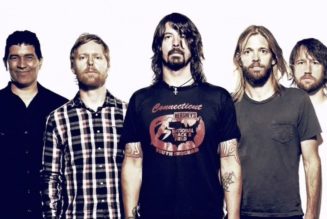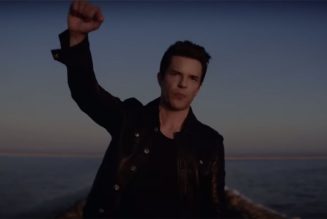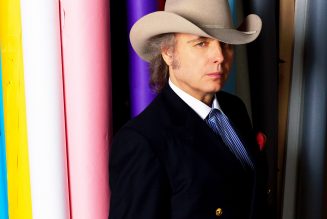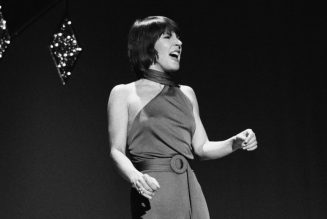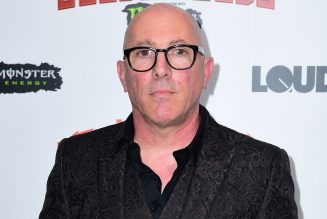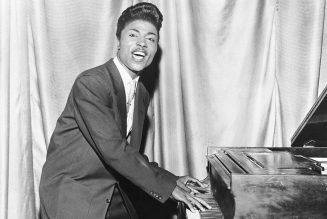
In his most recent book, TOTAL F*CKING GODHEAD: THE BIOGRAPHY OF CHRIS CORNELL (Out July 28), author Corbin Reiff presents the comprehensive life story of one of the most celebrated singers and songwriters in rock history — from his beginnings in Soundgarden, through Temple Of The Dog, Audioslave and beyond. In this exclusive excerpt, Reiff recounts the story behind the creation of one of Cornell’s most celebrated songs: “Black Hole Sun.”
Chris had secured his place as the preeminent screamer in rock, but as he wrote this latest batch of songs, he tried to explore the full dynamic range of his voice. He went deeper, and remained more subdued in spots, which only made the moments when he took off into the stratosphere that much more explosive. Each of the tracks on Superunknown has its own vocal flavor. Purposely mid-tempo deliveries give way to avalanches of screaming. Drudgy, syncopated verses are accented with twinkling falsettos. Sometimes he’s pressed right up into the front of the speaker, other times he hovers just underneath the music. Everything was by design.
Chris started to think of his voice as a separate entity; a character he could inhabit for the duration of a given track. This technique opened up a unique set of questions, chief among them being, “Who is the person singing?” and “What do they sound like?” Of all the aspects of his songwriting, this was the most difficult to nail down, but it was paramount to his new approach.
It all went back to the formative period when he was sitting alone in his room listening to the Beatles. He thought back to how the four distinct voices of John, Paul, George, and Ringo alternated between tracks, providing a different approach and feeling to each one. He couldn’t always tell who sang what, but the variety sounded so damn good. “I thought that’s what rock music was, and I thought that’s what making an album was,” he told Spin. “You sang in the style and with the feel that the song was asking for.” Without another singer in the band to help him, he’d simply have to do it himself.
Before Soundgarden got down to the brass tacks of recording their next album, however, they had to select a producer. It was nearly guaranteed that more people than ever before would be interested in what they did next, and Soundgarden wanted a fresh set of ears to help pull the best out of them. Originally, the plan was to work with Rick Rubin, but then they decided to take a meeting with a producer from New York named Michael Beinhorn.
Beinhorn had previously worked with the Red Hot Chili Peppers on some of their earlier efforts like The Uplift Mofo Party Plan and Mother’s Milk but had branched out into other genres, helping artists like Herbie Hancock, Soul Asylum, and the Violent Femmes. He was also no stranger to the Pacific Northwest. One of his more recent projects was a record titled Far Gone by another Seattle alt-rock band named Love Battery.
Beinhorn flew to Seattle and met with the band at Avast! where they spent a couple of hours getting to know one another. It seemed to go well enough, but Soundgarden still wasn’t convinced that he was the right man for the job. They took the producer out for a test run and set up a session at Bear Creek Studios to cut a couple of tracks with Beinhorn manning the boards.
Over the course of three or four days, the band recorded “She Likes Surprises” and “No Attention.” “It was more like a precursor to recording,” Beinhorn said. “It wasn’t the kind of thing where I had a lot of time or resources to muck about, so it moved relatively fast. Everyone got their parts done in a reasonable amount of time.” Not long after that he got the call. The job was his.
The creation of Superunknown began in earnest after the band mailed their new producer a cassette with a couple of fully realized songs like “Fresh Tendrils,” along with some riffs like the one that ended up being the basis for “Mailman” and a few instrumental jams. Beinhorn was impressed with some of the selections, but he felt there wasn’t enough material yet to justify entering the recording studio. “I think there were about five songs that ended up on the record, and the rest was kind of meandering a little bit,” he said.
The band wasn’t exactly thrilled to receive such unsparing criticism so early on this process, but as they would come to learn, Beinhorn was adamant about achieving the best results. “This record came at a time when you could really tell who the next big band was gonna be, and at that point in time, it was clearly Soundgarden,” Beinhorn said. “The entire music community was aware that if their next record had all the right ingredients it was gonna be humongous, and I had to do everything in my power to push it over the edge.”
Over the next few months, Soundgarden worked to create demos they hoped sounded good enough to everyone’s ears to make it onto the final tracklist. Chris traded the solitude of his basement for a week-long writing session at his best friend Eric Garcia’s small, octagon-shaped cabin across the water from Seattle in Port Townsend to get some more writing done. Superunknown wouldn’t suffer for a lack of preparation.
From the outset, Beinhorn was impressed by Chris’s skills as a DIY engineer. “Chris was an absolute first-rate demo-maker,” the producer noted. “He was one of those guys who could do everything. Write the music, record all the instruments, play everything himself; he had an enviable set of abilities.” Still, he got the sense that the singer was pushing himself too much. “He was kinda going off the rails a little bit,” Beinhorn said. “He was sending me a tremendous volume of music, but I noticed they were all cut from the same cloth. There was a sameness to them, and they didn’t have much purpose. They didn’t demonstrate his skills as a songwriter or a performer.”
At one point, Chris sent his producer a tape filled with eleven new songs, none of which made it onto Superunknown. “It’s so funny, but there was a point where I actually started to dread getting tapes from him in the mail,” Beinhorn said. After that episode, the two men had a conversation where Chris explained that he felt pressure to write songs that appealed to Soundgarden fans, a notion that the producer felt was counterproductive. To get him back on track, Beinhorn started talking about his musical roots and his general taste. “I was like, ‘What are you listening to? What’s inspiring to you?’ And he said, ‘The Beatles and Cream.’ And I said, ‘Write a song that’s like The Beatles and Cream.’ That was basically what precipitated the next tape I got from him, which was a home run.”
The new tape was anchored by a song that had come to Chris late one night while driving home. As the lines on the highway glided past, a dark and ephemeral melody popped into his head. It was entrancing. Once he made it back to his house, he raced to a tape recorder and whistled the part into the tiny machine so that he wouldn’t forget it.
“The first song on the tape was ‘Fell On Black Days,’” Beinhorn said. “The next song was a song called ‘Anxious,’ which didn’t get used, but it had Jerry Cantrell on guitar. It wasn’t appropriate for Superunknown, but it was great. More of a bluesy type thing. The song after that was called ‘Tighter & Tighter,’ which we did record, but never finished and they did after [on Down On The Upside]. And the last song on the tape was ‘Black Hole Sun.’”
The next day after his late-night moment of inspiration, Chris went down to the basement and started to transpose the music he’d whistled into the recorder onto the frets of his guitar. Once he nailed that part, he thought about a phrase he’d misheard recently during a television newscast that sparked his imagination. “I heard ‘blah blah blah Black Hole Sun blah blah blah,’” he told Uncut. Those three words were an intoxicating bit of imagery. “A black hole is a billion times bigger than a sun, it’s a void, a giant circle of nothing, and then you have the sun, the giver of all life,” Chris explained. “It was this combination of bright and dark, this sense of hope and an underlying moodiness.”
Once Chris had the title, a compelling collage of word-images that fit the dark mood of the music poured out of him, which he eventually honed into verses. Amid the snakes, the invocation of heaven and hell, and an allusion to the stench of summer, there were two lines rooted in recent experience. “Times are gone for honest men,” captures his perspective on the outside world, an increasingly cynical place, especially within the music industry. The other, “No one sings like you anymore,” was more personal, stemming from a comment a fan had made to him while on tour. Its true meaning and inclusion remain a mystery.
With lyrics married to the melody, Chris started mixing in the unique musical elements that make “Black Hole Sun” the zeitgeist-bending piece of music that it became. The process moved quickly, and the early demo version included on the deluxe edition of Superunknown is remarkable for how complete it sounds. Right away, that mystically tuned, arpeggiated guitar intro gives way to the haunting, chorus-painted chord progression through the verses before the quick drum break signals the beginning of a disembodied chorus. Even the psychedelic, wah-wah drenched solo is there. It doesn’t sound anywhere near as dynamic in this nascent form— Chris’s vocals are far more subdued—but every element is intact, ready for the addition of Cameron’s drums, Shepherd’s bass and Thayil’s frenzied lead guitar to realize its full potential.
[embedded content]
“Black Hole Sun” was a breathtaking revelation for Beinhorn. “I played it fifteen times in a row,” the producer said. “Once I pulled myself away from it, I called him, and when he picked up, the first thing I said to him was, ‘You’re a fucking genius!’” Chris was surprised. “He was like, ‘Oh, do you like it?’ I was like, ‘Do I like it? It’s one of the best songs I’ve ever heard!’”
Even his bandmates knew that “Black Hole Sun” was a different animal. Ben Shepherd equated it to Stevie Wonder. Hiro Yamamoto, who had heard an early version one day while stopping by Avast! to say hello, immediately declared the song a hit, before bursting into laughter. The only person who couldn’t wrap his head around its whimsically brooding appeal was the guy who wrote it. Chris figured it might make for a decent third or fourth single. The idea that it could become a worldwide smash seemed impossible. “When I think of hit songs, they have to be somewhat anthemic in the world of rock, and I didn’t see ‘Black Hole Sun’ as being that,” Chris said.
From the book TOTAL F*CKING GODHEAD: THE BIOGRAPHY OF CHRIS CORNELL by Corbin Reiff. c 2020 by Corbin Reiff. Reprinted by permission Post Hill Press.


